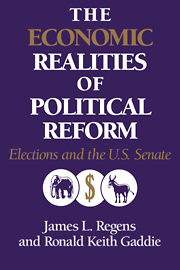Book contents
- Frontmatter
- Contents
- List of tables and figures
- Acknowledgments
- Abbreviations
- Introduction
- 1 The Senate in transition and campaign finance
- 2 Early money and profit taking in Senate campaigns
- 3 Targeting rent provision by major interests
- 4 Sitting in the cheap seats?
- 5 Implications for campaign-finance reform
- 6 Reform and the rent-seeking legislature
- Notes
- Bibliography
- Index
5 - Implications for campaign-finance reform
Published online by Cambridge University Press: 18 December 2009
- Frontmatter
- Contents
- List of tables and figures
- Acknowledgments
- Abbreviations
- Introduction
- 1 The Senate in transition and campaign finance
- 2 Early money and profit taking in Senate campaigns
- 3 Targeting rent provision by major interests
- 4 Sitting in the cheap seats?
- 5 Implications for campaign-finance reform
- 6 Reform and the rent-seeking legislature
- Notes
- Bibliography
- Index
Summary
Abuses of campaign spending and private campaign financing do not stop at the other end of Pennsylvania Avenue. They dominate congressional elections as well.
Senator Edward M. Kennedy Congressional Quarterly Weekly Report, October 11, 1974In the preceding chapters, we have presented an argument in support of the notion that U.S. Senators' behavior resembles that of rent-seeking firms in a competitive market. This chapter presents the findings from those chapters in a comprehensive fashion so we can assess alternatives to the present system of campaign finance. We discuss the impact of various campaign-finance reform proposals on candidate rent acquisition and, therefore, Senate election outcomes. Specifically, we examine lower political-action-committee (PAC) contribution limits, PAC abolition, public financing, matching funds, and spending caps. Ultimately, each reform results in a paradox that is not necessarily an improvement over the preexisting rent-seeking system. For example, spending caps confront constitutional problems, some of which are set forth in Buckley v. Valeo [424 U.S. 51 (1976)]. Even if constitutionally permissible, others have referred to caps as incumbent protection, making the task of defeating an incumbent almost impossible (see Thomas, 1989; Silberman and Yochum, 1978; Jacobson, 1976). Public financing may not be feasible given existing federal deficits. Matching funds transfer capital outlays for campaigns to the government, but still require candidates to raise money, leaving open the potential for rent seeking.
- Type
- Chapter
- Information
- The Economic Realities of Political ReformElections and the US Senate, pp. 86 - 98Publisher: Cambridge University PressPrint publication year: 1995



